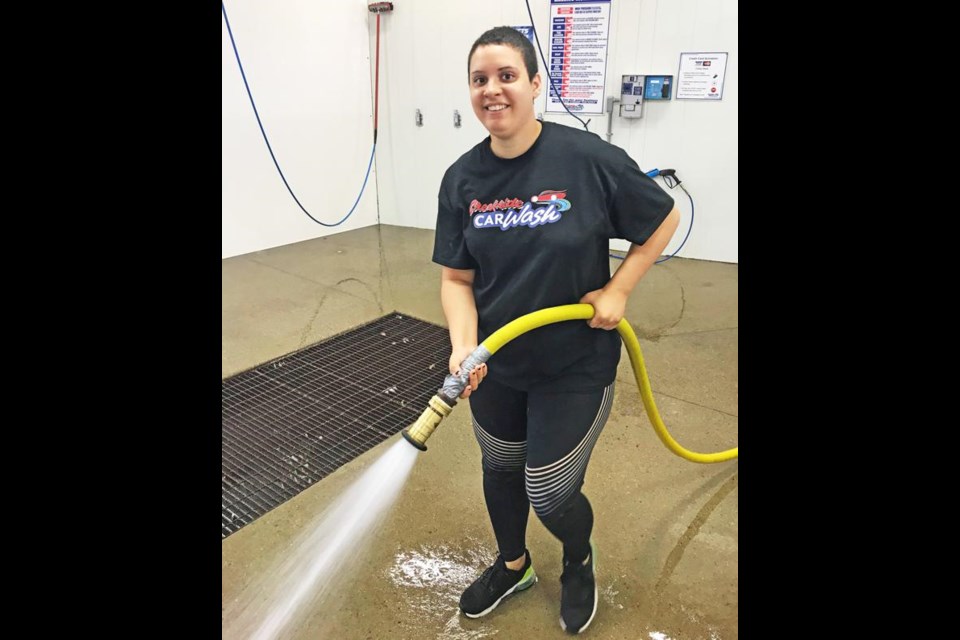(Shown above are three participants in the supportive employment program:Danielle Stachoski has been employed at Creekside Carwash since August 2019. Creekside has created a workplace environment conducive for success by recognizing the skills of all individuals. Joshua Baun has been employed with Rona since it opened in September 2020, prior to that he was employed by New Age Motorsports since May 2018. Leah Whitrow has been employed with the Rolling Pin Bakery and Café since March 2021. The Rolling Pin Bakery has created a pro-accessibility culture by having a workplace environment that is welcoming to all, exemplifies acceptance and respect, all while breaking down barriers! When asked about her position, Leah says “she just loves bring there!”)
There are many advantages and benefits to the community, businesses and individuals when a person with a disability is hired through the supportive employment program operated by the Weyburn Wor-Kin Shop.
Members of the Weyburn Chamber of Commerce heard these points made at their virtual coffee session on May 18, with executive director Jeff Richards and Meagan McLeod, supportive employment coordinator and job coach.
Richards noted that the two positions filled by Meagan are supported by the federal Immigration and Career Training ministry, and said her position is to engage people with disabilities in meaningful jobs in the workforce.
“The goal of the supportive employment program is that everybody who wants employment can attain a job if they have proper supports in place,” she said, going on to dispel misconceptions people have about who can or can’t be employed.
McLeod pointed out there are outdated beliefs that people with disabilities can’t be employed meaningfully, or that workplaces would require expensive upgrades to adapt to someone with disabilities.
Having employment is not simply to make money, she noted, but it helps promote self-worth and they can contribute better to the community. “Employment is key for people who experience disability having full participation in society,” she said.
Those with disabilities are good workers also, as they have identical job performance reviews as more able-bodied workers do, plus most work places require minimal to no upgrades for a person of disability to work there, McLeod explained, with research showing 57 per cent of employers don’t need to make any adaptations for such a worker.
The allowances that are usually needed include a flexible work schedule with modified or reduced hours, or in some cases a special chair to accommodate their physical needs.
“Another misconception is that training someone with a disability is expensive or just difficult,” said McLeod, pointing out that every employee’s needs for training is different and they are no different, plus there is job coaching available to help out if needed.
Having a more diverse workplace will benefit the company, she added, sharing the results of research done with companies who hire those with disabilities.
Those with disabilities are twice as likely to meet or exceed the targets set by a company, they are three times more likely to be high-performing workers, six times more likely to be innovative and agile in the workplace, and eight times more likely achieve better business outcomes, said McLeod.
“Research also shows that workplaces that hire people with disabilities have higher productivity, reduced turnover and increased job performance and job quality,” she said. “I think one of the biggest benefits is increased productivity as you can use workers’ skills to the best advantage by reassigning tasks to match the employees at all levels, reorganizing responsibilities for better flow and productivity, and identifying unmet needs in the workplace.”
She pointed out it’s to a business’s advantage not to have a highly-trained and educated employees do such tasks as photo-copying, filing and shredding, but to hire someone with a disability to take care of these kinds of tasks, freeing them to do the jobs they are trained for.
In addition, said McLeod, “employees with disabilities are more likely to follow safety protocols than the able-bodied employees, so hiring those with disabilities really is good for the business.”
Employees with disabilities also can be exempt from the minimum three-hour payment for being called out to work, she noted, where she would have to be paid for three hours if she were called and only had to work for an hour.
Last year, the supportive employment program had 55 people enrolled from Weyburn, Midale and Estevan, but this year, with COVID restrictions in place, she’s concentrating on those based in Weyburn, and she has 30 to 32 individuals in the program currently.
Programs like this one will be celebrated with National AccessAbility Week, set to be held across Canada on May 30 to June 5, with the theme, “Leaving No One Behind”.
National AccessAbility Week (NAAW) is an opportunity:
• to celebrate the valuable contributions of Canadians with disabilities;
• to recognize the efforts of individuals, communities and workplaces that are actively working to remove barriers to accessibility and inclusion.
According to the federal ministry of Employment and Social Development Canada, “We all benefit from a society and an economy without barriers to inclusion. When persons with disabilities can participate in all aspects of society, including accessing employment, resources and services, it enriches Canada’s economy.”




